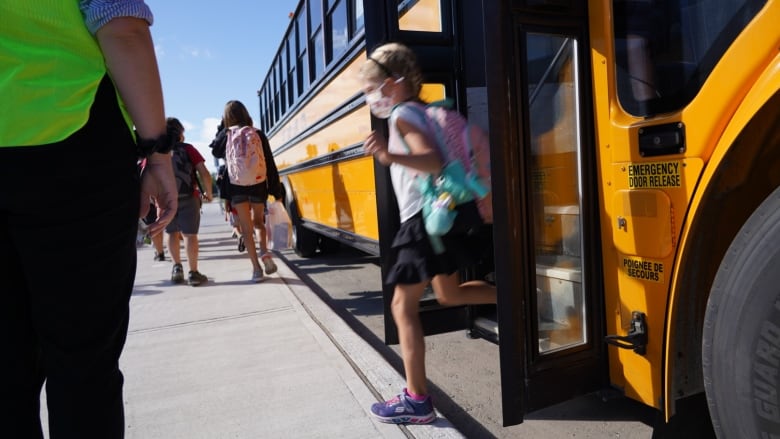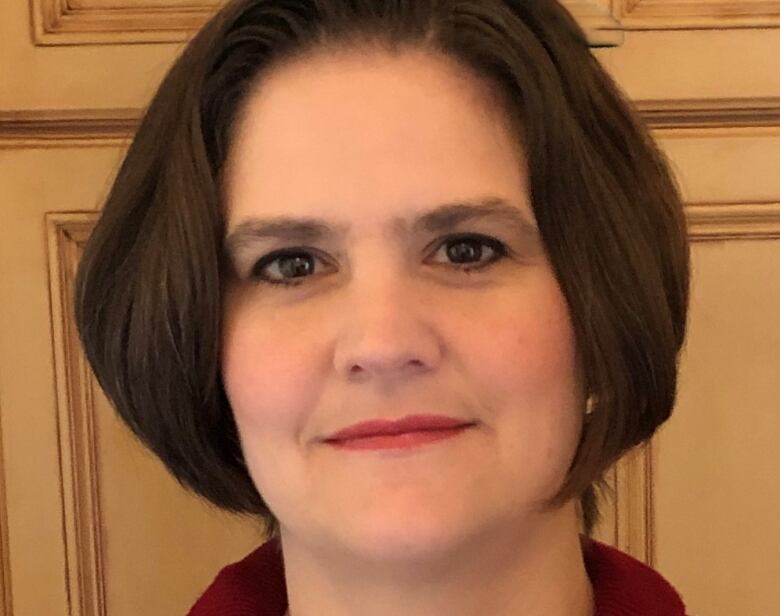With masks now mandatory, here's what parents need to think about as kids head back to school
How many masks do you send to school with your child, and what about mask anxiety?

Many parents are breathing a sigh of relief with the Wednesday announcement that masks will be mandatory for students in grades 4 and up in Manitoba, but they're now left with otherquestions to consider.
How many non-medical face coverings do you send your child to school with every day? Where do they put them during "mask breaks," and does that doffing and donning carry a risk of contaminating shared surfaces? And what about stigma: how do you prevent and protect them from shaming and bullying?
Experts say there are a range of behavioural, psychological and practical mask hurdles that parents should consider talking out with their children and practise, practise, practise proper mask use.
Michelle Driedger, aprofessor of community health sciences at the University of Manitoba,stressedthe importance of hammering home the fundamentals now.
"I've even seen with my daughters, they'll put them down on the counter and then pick them up and put them on, and it's like 'OK, we're going to try to address some of these things because you can't go doing that in school,'" Driedger said.
Parents will have to consider how many masks to send to school, and schools will have to ensure students understand how to safely put on, remove or change masks without contaminating shared surfaces.

Once a mask gets moist from prolonged use, coughing or sneezing, it can become less effective, said Driedger, so it's important those in schools don't develop a false sense of security.
"How clearly is that going to be communicated, both from teachers to students but then also even from parents to their kids to help reinforce those kinds of messages before kids go into school?"
Working through anxiety
Forming or changing habits can be a long slog generally, but in the context of a pandemic the stakes may feel higher. Don't expect perfect mask usage on the first day, said Dr. Jo Ann Unger.
"We're asking kind of kids and parents on a really widespread level to do a really big behavioural change," said Unger, a clinical psychologist and director of Kidthink Children's Mental Health Centre.
"It's going to be part of their everyday school life, so it's going to be bumpy."

Unger said parents and teachers need tounderstand the importance of their roles in coming up with mask strategies and practising those with children until they become routine.
Though parents may feel comforted by the mask mandate, Unger also said that may or may not be the case for all children, especially those who aren't used to wearing masks yet. Seeing and wearing masks everyday in school could be a source of anxiety, she said.
"The mask, and seeing masks around them, is a reminder that we are still in a global pandemic," she said.
KidThink is holding two free webinars one on Aug. 26 and another Sept. 16 to share tips for managing back-to-school anxiety amid the pandemic.
Stigma and bullying
Unger suggested it is incumbent on parents and educators to use calm and reassuring language when discussing why masks are necessary.
She said parents should also be mindful not to project their own anxieties and fears onto their children. Instead, ask your child if they have any questions about going back to school and masks, said Unger.
Another concern is bullying or stigma of those who are exempt from wearing masks for a range of health reasons, or those in younger years whose parents opt to have their kids mask up in a classroom where their peers aren't doing the same.
That's ultimately going to come down to school administrators and teachers setting a good example, said Unger.
"When and if it does happen kids are humans and they make mistakes and they say mean things sometimes [teachers need to ensure] that it's addressed and not just ignored so that that culture of safety and allowing for difference is fostered, and kids can feel emotionally safe to make those kinds of decisions that are best for them."
The power of play
But it also helps to lighten the mood where possible. Consider buying your child masks with fun prints on them, said Unger.
Tanya Hoover, a certified play therapist with the Canadian Association for Play Therapy, urges parents torememberto prioritize having fun.
"This year is going to be stressful for all of us: kids, parents, teachers, school administrators. Play is a stress releaser. Play helps kids process things. Play helps you connect. So play!" said Hoover, who also holds a master's of social work degree and early childhood education certificate.
"Find what brings your children and you joy and engage in all the play you can while, of course, taking all necessary precautions."












_(720p).jpg)


 OFFICIAL HD MUSIC VIDEO.jpg)
.jpg)



























































































